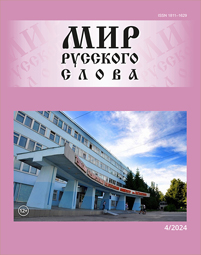The phenomenon of “mozhnopozhaluista”: The genesis and functioning of a strange Formula
DOI:
https://doi.org/10.21638/spbu30.2024.401Abstract
The article examines the existing version of the tracing origin of the formula “mozhnopozhaluista” and proposes an alternative interpretation. The following arguments are put forward against the version of tracing: 1) in English formulas such as May I please…, Could you please… there is no “gluing” of the modal verb and interjection; 2) units with specific semantics are usually subject to tracing, but in this case we are talking about a unit of a different type of semantics, which serves only as a modal frame of the request; the authors are unaware of examples of tracing such units in Russian; 3) the condition for such tracing is not just familiarization of young people with the English language, but regular switching from Russian to English and back in live communication, which is simply not the case. The influence of the new business etiquette is also rejected. An alternative version is based on an analysis of the semantics and pragmatics of the formula, taking into account processes relevant to modern Russian speech. Based on data from the Russian National Corpus, it is argued that the main factor in the emergence and spread of the formula “mozhnopozhaluista” was the “fading” of the once bright means of indirect request: the interrogative nature of the mozhno-/moch’-question ceases to be recognized, along with the awareness of it as means of emphasized politeness, mozhno-question begins to be used, among other things, to express an irritated demand (second half of the 20th century) — and then speakers start feeling like introducing an additional indicator of politeness into the statement. Only after this could the influence of the English language, which allows the functioning of please both in indirect speech acts and in questions, be realized. The results of a survey of students of different courses and different training profiles show that the formula “mozhnopozhaluista” is in the active pragmaticon of a minority of respondents, but the majority of respondents (83 %) rate it as acceptable or higher. This is exactly the condition that licenses the rapid spread of a strange formula in the speech of young people.
Downloads
References
Downloads
Published
How to Cite
Issue
Section
License
Articles of "The World of Russian Word" are open access distributed under the terms of the License Agreement with Saint Petersburg State University, which permits to the authors unrestricted distribution and self-archiving free of charge.




